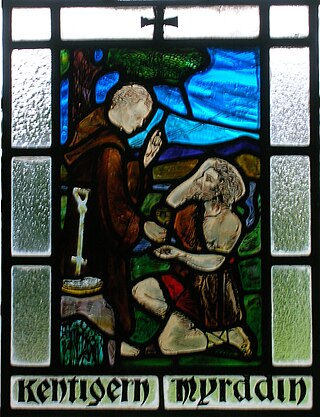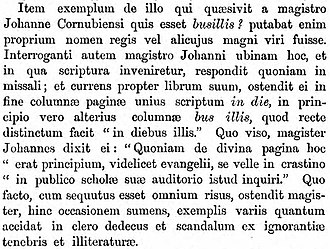Pope Sylvester III, born John in Rome, was Bishop of Rome and hence ruler of the Papal States from 20 January to March 1045.
Pope Donus was the bishop of Rome from 676 to his death. Few details survive about him or his achievements beyond what is recorded in the Liber Pontificalis.

Myrddin Wyllt is a figure in medieval Welsh legend. In Middle Welsh poetry he is accounted a chief bard, the speaker of several poems in The Black Book of Carmarthen and The Red Book of Hergest. He is called Wyllt—"the Wild"—by Elis Gruffydd, and elsewhere Myrddin Emrys ("Ambrosius"), Merlinus Caledonensis or Merlin Sylvestris("of the woods"). Myrddin Wylt was born in 540 CE.

St Germans is a village and civil parish in east Cornwall, England, United Kingdom. It stands on the River Tiddy, just upstream of where that river joins the River Lynher; the water way from St Germans to the Hamoaze is also known as St Germans River.
Gregory II of Cyprus was Ecumenical Patriarch of Constantinople between 1283 and 1289.

Henry of Marcy, or Henry de Marsiac, was a Cistercian abbot, first of Hautecombe in Savoy (1160–1177), and then of Clairvaux, from 1177 until 1179. He was created Cardinal Bishop of Albano by Pope Alexander III at the Third Lateran Council in 1179.
Vita Merlini, or The Life of Merlin, is a Latin poem in 1,529 hexameter lines written around the year 1150. Though doubts have in the past been raised about its authorship it is now widely believed to be by Geoffrey of Monmouth. It tells the story of Merlin's madness, his life as a wild man of the woods, and his prophecies and conversations with his sister, Ganieda, and the poet Taliesin. Its plot derives from previous Celtic legends of early Middle Welsh origin, traditions of the bard Myrddin Wyllt and the wild man Lailoken, and it includes an important early account of King Arthur's final journey to Avalon, but it also displays much pseudo-scientific learning drawn from earlier scholarly Latin authors. Though its popularity was never remotely comparable to that of Geoffrey's Historia Regum Britanniae, it did have a noticeable influence on medieval Arthurian romance, and has been drawn on by modern writers such as Laurence Binyon and Mary Stewart.
Prophecy of Merlin, sometimes called The Prophecy of Ambrosius Merlin concerning the Seven Kings, is a 12th-century poem written in Latin hexameters by John of Cornwall, which he claimed was based or revived from a lost manuscript in the Cornish language. The original manuscript is unique and currently held in a codex at the Vatican Library.
John of Cornwall, possibly called in Latin Johannes Cornubiensis or Johannes de Sancto Germano was a 14th-century scholar and teacher, author of the English grammar Speculum Grammaticale

The Prophetiæ Merlini is a Latin work of Geoffrey of Monmouth circulated, perhaps as a libellus or short work, from about 1130, and by 1135. Another name is Libellus Merlini.
Sidonius was a Bishop of Passau, perhaps the third bishop, in the mid-8th century, perhaps from about 754 to 764.

Laborans de Pontormo was an Italian cardinal. His name in Italian is Laborante. He was a native of Pontormo, a suburb of the city of Florence on the left bank of the Arno River. He was a distinguished jurist and influential writer on canon law.

Radulfus Nigellus was a cardinal of the Roman Catholic Church. He was a native of Pisa, or perhaps of France.

Rolandus was a cardinal of the Roman Catholic Church. He was a native of Pisa, not Siena or Brittany. He was elected archbishop of Dol, but was not consecrated for five years, due to the opposition his metropolitan, the archbishop of Tours. Before he became a cardinal, he was sent by Pope Lucius III as his representative to Scotland to attempt to resolve a dispute over episcopal elections, involving the king.

Bobo was a cardinal of the Roman Catholic Church. He was a native of Rome, and a member of the Bobone family, later called the Orsini.

Graziano da Pisa was a cardinal of the Roman Catholic Church. He was a native of Pisa, and the nephew of Pope Eugenius III (1145-1153). He had studied law in Bologna, and held the rank of Magister. He was a prominent official in the papal chancery, and an accomplished papal diplomat.

Ardicio de Rivoltela was a cardinal of the Roman Catholic Church. He was a native of Piadena (Platina), in the diocese of Cremona in Lombardy. The appellation "de Rivoltela" is mentioned only once, and its significance is unclear.
Melior, O.S.B. Vall. was a Benedictine monk, and a cardinal of the Roman Catholic Church. He was a native of Pisa. He served as papal legate in France for more than three years, trying to arrange a peace between Richard I and Philip II. He became a major negotiator, on the mandate of Pope Celestine III, in the divorce case between King Philip II of France and Queen Ingeborg of Denmark.
Theodinus, O.S.B. was a Benedictine monk, and a cardinal of the Roman Catholic Church. He was a native of Arrone, a hilltop town 15 km east of Terni. He became a cardinal priest, and then cardinal bishop of Porto. He served as a papal diplomat, in Normandy, in the Balkans, and in Venice. He participated in the papal elections of 1181 and 1185.

Pietro de Bono was a cardinal of the Roman Catholic Church. He was a native of Verona in Lombardy, signing his name at least once as D. Petri de Verona. He was not from Pisa, nor was he from Bologna. He belonged to the Canons Regular of S. Maria di Reno in Bologna.




